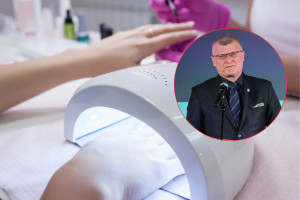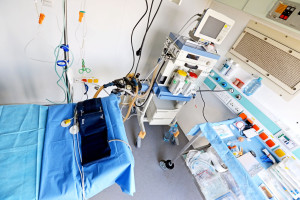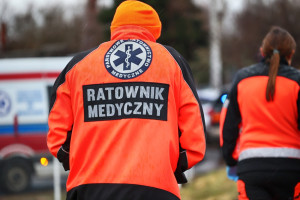Medical analytics is not for biologists and veterinarians. There are no postgraduate studies for them

- Masters in biology, biotechnology, chemistry, pharmacy or veterinary medicine complain about the impossibility of completing postgraduate education in the field of medical analytics, which limits their access to the profession of laboratory diagnostician
- Universities do not conduct recruitment for postgraduate studies in medical analytics despite significant interest from graduates
- The Ombudsman for Human Rights, Marcin Wiącek, asks the Minister of Health, Izabela Leszczyna, to take effective measures to ensure such a possibility.
The issue was already raised by the Office of the Commissioner for Human Rights in a letter to the Ministry of Health dated February 10, 2023. At that time, the Ministry indicated that, taking into account the great interest of graduates of fields useful for laboratory diagnostics, especially those employed in medical diagnostic laboratories, in August 2022 a verified "Curriculum for professional postgraduate education in the field of medical analytics" was published.
It was added that in the same year, new regulations on laboratory diagnostics came into force, and the Ministry of Health sent information to universities offering education in the field of medical analytics about the changed curriculum and the possibility of obtaining the title of laboratory diagnostician based on the new education path.
However, subsequent complaints indicate that universities are still not recruiting for postgraduate studies in medical analytics despite significant interest from graduates, the Ombudsman points out.
As it results from the complaints submitted to the Ombudsman, the applicants fear that refraining from conducting postgraduate studies may be the result of a long-standing dispute between various professional groups about the justification for allowing persons who have not completed five-year studies in a given field to practice their profession.
"The decision is up to the university authorities"On March 12, 2025, BRPO renewed correspondence on this matter. The Ministry of Health was asked for information on whether it receives reports of blocking access to postgraduate education , the scale of these reports, and what actions have been taken.
In the response of 11 April this year, it was indicated that the provision enabling access to the profession of laboratory diagnostician for persons who completed studies in specific fields and then undertook postgraduate education is of a transitional nature . It was emphasised that universities have the right to decide whether or not to launch postgraduate studies.
It was added that after the introduction of changes in access to the profession of laboratory diagnostician, the Ministry of Health began to receive questions about the possibility of starting postgraduate studies in medical analytics by people with a master's degree in fields applicable in laboratory medicine. The ministry was to inform university rectors about this, but the final decision rests with them.
Has an illusory path to entry into the profession been created?The Ombudsman reminds that Article 11 of the Act on Laboratory Medicine specifies the requirements for those wishing to pursue the profession of a laboratory diagnostician, and one of the possibilities of entering the profession is to complete uniform master's studies or first and second-cycle studies in biology, biotechnology, chemistry, pharmacy or veterinary medicine by 31 December 2028 , obtain a professional master's degree (or equivalent) and complete postgraduate education in medical analytics at a university that offers studies in the field of medical analytics, confirmed by an examination.
- The legislator's will was to guarantee access to this profession for a group of graduates of specific fields until the end of 2028, after completing postgraduate studies in medical analytics. If the legislator considered such a solution to be justified, it should have created real opportunities to obtain the qualifications of a laboratory diagnostician. If, however, it considered such a solution to be pointless or impossible to implement, it should have refrained from introducing it - the spokesman indicated in the letter.
The Commissioner for Human Rights emphasizes that failure to provide access to postgraduate studies in the field of medical analytics is tantamount to depriving Article 11, paragraph 1, point 3 of the Act on Laboratory Medicine of its effectiveness. The actual lack of possibility to complete postgraduate studies – starting from the entry into force of the aforementioned provision – makes the described path to the profession illusory.
In the opinion of the Advocate, in view of the fact that for several years now recruitment to postgraduate studies in the field of medical analytics has not been ensured, and thus access to the profession of laboratory diagnostician has been limited for a specific group of people, the actions of the Ministry of Health, consisting in sending information to universities about the change in regulations and the interest of graduates in the profile of studies, seem to be insufficient . The obligation to enforce the provision should not be affected by the fact that art. 11 sec. 1 item 3 is an episodic provision.
The Ombudsman therefore asks the Ministry of Health to take effective action to ensure that Masters in biology, biotechnology, chemistry, pharmacy or veterinary medicine have the opportunity to pursue postgraduate studies in medical analytics and, consequently, ensure a real path of access to the profession of laboratory diagnostician on the basis of Art. 11 sec. 1 item 3 of the Act.
Alternatively - when it is not possible to provide access to the profession in this way - the Commissioner for Human Rights asks to consider changing the regulations. Their current form may be misleading, suggesting that it is possible to obtain the education referred to in art. 11 sec. 1 item 3, and thus acquire the qualifications of a laboratory diagnostician.
What is the crux of the dispute?The aforementioned conflict dates back to previous governments, the Laboratory Medicine Act of 2022 and work on the Rare Disease Plan, led by Prof. Anna Latos-Bieleńska. It concerns access to the profession of laboratory diagnostician and the specialization in medical molecular genetics, which would be available to graduates of biomedicine, biotechnology, biology, genetics.
At some point, the community was ignited by a discussion about who and under what conditions should be able to conduct genetic testing, and concerns arose about an attempt to "exclude" these tests from broadly understood medical diagnostics.
At the same time, there was a debate on access to the profession of laboratory diagnostician and the possibility of supplementing knowledge during postgraduate studies comparable to that obtained in the field of medical analytics, i.e. the current field of study for laboratory diagnosticians. It was argued at the time that biologists and biotechnologists acquire technological knowledge related to conducting scientific research and operating specialist equipment, while the education of laboratory diagnosticians focuses on medical knowledge.
Copyrighted material - reprint rules are specified in the regulations .
rynekzdrowia














